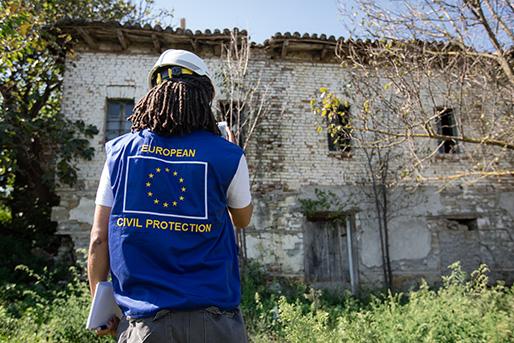In the EU, protecting people, property, environment, and cultural heritage against multiple threats is primarily a national responsibility. However, the EU complements, supports, coordinates national action, and promotes cross-border cooperation on these matters.
A wide set of EU policies and funds aim to strengthen collective safety and resilience against adverse events. Under the EU Civil Protection Mechanism, 27 EU countries and 10 other participating states regularly exchange information on disaster risks.
They also run exercises together and pool rescue teams and equipment that can be rapidly mobilised when a disaster hits any other country in the world.
Disaster resilience goals
The European Commission and the EU Member States have devised 5 disaster resilience goals to steer our work in disaster prevention and preparedness.
The goals include anticipating and preparing for risks, enhancing early warnings, scaling up response capacities and securing robust civil protection systems.
They serve as a compass for policy and investments that can help authorities make better-informed decisions and protect citizens, livelihoods, and the environment.
They are formulated in a Commission Recommendation and accompanying Communication.
Progress report on prevention and risk management in Europe
Actions to strengthen prevention and risk management are set out in Article 6 of the EU Civil Protection Mechanism decision. A first progress report on the implementation of Article 6 was issued in March 2024.
The report stock of progress on implementation of instruments like peer reviews, mechanism for cooperation and the European disaster resilience goals.
It also provides an analysis of national reports on disaster risk management, and proposes recommendations for future actions. A supporting Commission staff working document provides further details.
Mapping key disaster risks in Europe
A robust understanding of disaster risks is the first step towards addressing the risks effectively by framing risk management policies. This is why the European Commission regularly prepares overviews of natural and human-induced disaster risks that the EU faces (e.g., publications from 2014, 2017, and 2020).
Wildfire prevention action plan
The 2022 wildfire season confirmed an upward trend in intense wildfires. Many Member States requested assistance under the EU Civil Protection mechanism.
With climate change, this upward trend in wildfire intensity is expected to exacerbate in the future. To help better manage forests and landscapes, reduce the ignition of fires in the first place and limit their impacts, the Commission has put forward a wildfire prevention action plan.
Prevention and Preparedness Projects in Civil Protection
The EU Civil Protection Mechanism supports EU countries and participating states in disaster prevention and preparedness, providing single country and multi-country grants.
Single country grants are direct grants to national civil protection authorities, offering them technical assistance. National authorities prepare investments in disaster prevention and preparedness and feasibility studies and cost-benefit analyses.
Multi-country grants support consortia of civil protection stakeholders, including national and sub-national authorities, universities, NGOs, private sector and international organisations.
Since 2014, we have funded more than 149 projects.
Technical Assistance Financing Facility for Prevention and Preparedness (TAFF)
A novel technical assistance instrument launched in 2024 as a partnership between the European Commission Civil Protection and Humanitarian Aid department and the World Bank Group.
TAFF aims to support EU countries and participating states of the EU Civil Protection Mechanism as well as Georgia and Kosovo* to increase their technical capacity for disaster prevention and preparedness. The instrument is fully aligned with the implementation of the European Union Disaster Resilience Goals adopted by the European Commission in 2023.
The facility will provide access to tailor-made technical support through leading global disaster and climate resilience expertise.
*This designation is without prejudice to positions on status and is in line with UNSCR 1244/1999 and the ICJ Opinion on the Kosovo Declaration of Independence
Economics for Disaster Prevention and Preparedness
Actions to strengthen financial preparedness are needed to reduce the impacts of disasters on people, economies and government budgets. Beyond the financial aspects, prevention and preparedness actions also need to be combined with investments in green and resilient infrastructure.
Recent analytical work on the Economics for Disaster Prevention and Preparedness shows that the benefits of investment usually exceed the costs. They also unlock social and economic opportunities that have an advantage even if no disaster occurs.
Research and knowledge sharing
The Disaster Risk Management Knowledge Centre provides EU Member States and the disaster risk management community with an online repository of disaster-related data, research and project results and access to a range of networks and partnerships.
The Union Civil Protection Knowledge Network will further facilitate collection and sharing of knowledge and experience to improve prevention, preparedness and response to crises. It will also stimulate research and innovation in the sector and strengthen the links between disaster management and civil protection actors.
Peer reviews
A peer review of disaster risk management and civil protection arrangements provides a country or a region with a unique opportunity to reflect on its readiness to cope with hazards and identify ways of strengthening its broader prevention and preparedness system.
Prevention and preparedness missions (advisory missions)
Advisory missions offer tailor-made support and advice for a better response to the negative impacts of natural and human-induced hazards. Experts from EU Member and participating states are deployed upon request from a national government or the United Nations to support authorities across the world.
Enhancing international cooperation
Disaster risk management in the EU is closely linked to global initiatives, in particular, the Sendai Framework for Disaster Risk Reduction 2015-2030.
Although the European Commission is not a signatory to the Sendai Framework, it played a leading role in the international negotiations, supports EU Member State signatories and third countries in implementing the Agreement, and works to ensure EU action is coherent with the global agenda.
Click here to read the mid-term review.
Last updated: 14/05/2024

